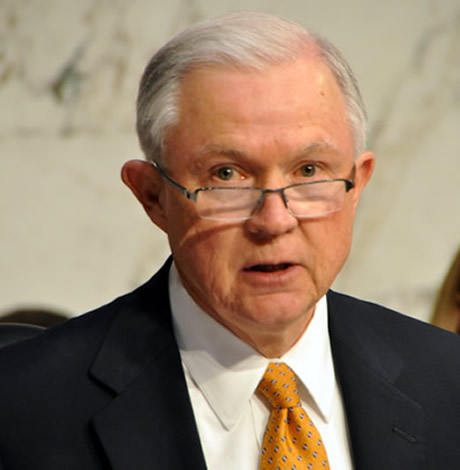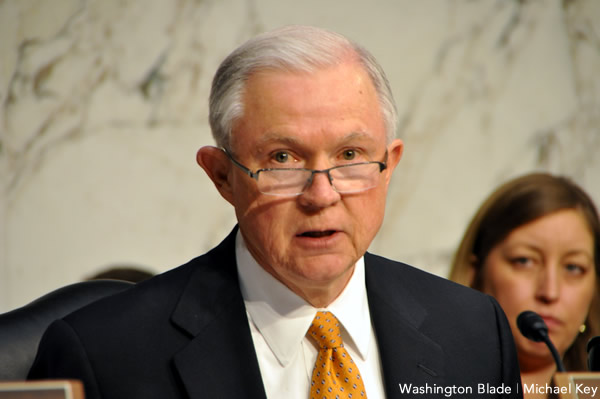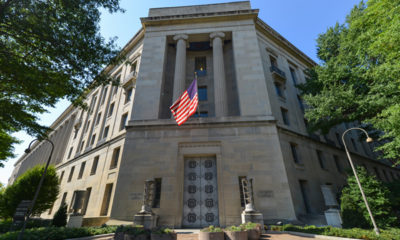National
Sessions to enforce hate crimes law ‘aggressively’ for trans murders
14 anti-trans killings have already taken place halfway through 2017


U.S. Attorney General Jeff Sessions (R-Ala.) has pledged to enforce the hate crimes law for transgender murders. (Washington Blade file photo by Michael Key)
U.S. Attorney General Jeff Sessions — criticized for his long anti-LGBT record — pledged Thursday to enforce the federal hate crimes law “aggressively and appropriately” in cases of ongoing transgender murders.
Sessions made the remarks at a hate crimes summit held at the Justice Department, saying the Trump administration is committed to reducing violent crimes and “hate crimes are violent crimes.”
“No person should have to fear being violently attacked because of who they are, what they believe, or how they worship,” Sessions said. “So I pledge to you: As long as I am attorney general, the Department of Justice will continue to protect the civil rights of all Americans — and we will not tolerate the targeting of any community in our country.”
Sessions ticked off a few Justice Department ongoing investigations under the Matthew Shepard & James Byrd Jr. Hate Crime Prevention Act – a measure he opposed as a U.S. senator before former President Obama signed it into law in 2009.
Commending the work of FBI and international partners, Sessions said a suspect was found and arrested in Israel for allegedly making threatening phone calls to Jewish community centers. The Justice Department, Sessions said, brought federal charges against him and continues an investigation into whether the acts are hate crimes.
In response to potential anti-Islamic hate crimes, Sessions recalled seeking an indictment of a Texas man who now faces 40 years in prison for burglary and arson of the Victoria Islamic Center; a man sentenced to more than 19 years in prison for trying to recruit people to help him burn down a mosque in New York State; and the indictment of Kansas man for shooting three men at a bar because he thought they were of Persian origin.
But Sessions also made a point to commit to enforcing hate crimes law when it comes to violence against transgender people, pointing to the first-ever prosecution of an anti-transgender hate crime under the Matthew Shepard & Hate Crimes Prevention Act, which recently resulted in a conviction under the law.
“We have and will continue to enforce hate crime laws aggressively and appropriately where transgendered individuals are victims,” Sessions said. “Last month, Joshua Brandon Vallum was sentenced to 49 years in prison for assaulting and murdering Mercedes Williamson. This is the first case prosecuted under the Hate Crimes Prevention Act involving the murder of a transgender person.”
Amid ongoing reports of transgender murders throughout the country, Sessions said he personally met with the department’s senior leadership and the Civil Rights Division on the issue. According to the Human Rights Campaign, those murders have reached a tally of 14 only halfway through 2017.
Sessions said he directed the Civil Rights Division to work with U.S. attorneys’ offices and the FBI to “support the state and local law enforcement authorities investigating these incidents and to determine whether federal action would be appropriate.”
Further, Sessions said he directed the review of files “to ensure that there is no single person or group behind these murders or to what extent hate crime motivation lies behind such murders.” Sessions said he receives regular updates on these reviews.
The attorney general’s remarks come after LGBT rights supporters sought to derail his nomination unsuccessfully based on his anti-LGBT record as a U.S. senator, which includes votes against the hate crimes law, “Don’t Ask, Don’t Tell” repeal and the Employment Non-Discrimination Act as well as support for a U.S. constitutional amendment banning same-sex marriage.
Upon confirmation as attorney general, Sessions revoked Obama-era guidance instructing schools to allow transgender students to use the bathroom consistent with their gender identity. Sessions said the law on which the guidance was based, Title IX of the Education Amendments of 1972, doesn’t make that a requirement — despite numerous court rulings that have determined otherwise.
Emily Waters, senior manager of national research and policy at the New York City Anti-Violence Project, said Sessions’ speech doesn’t make up for his other actions at the Justice Department.
“We won’t allow Jeff Sessions to use the violence perpetrated against LGBTQ people, and particularly the homicides of transgender women of color, to push forward a pro-policing agenda that does not acknowledge, recognize or protect LGBTQ people of color who are victims of police violence and brutality,” Waters said. “This is very clearly a tool to get more money for policing, and has nothing to do with actual hate crime prevention. If Jeff Sessions truly cares about LGBTQ people, then he would be diverting resources into the communities most impacted to address the real root causes of violence.”
On the same day Sessions delivered the remarks, the White House announced President Trump nominated Eric Dreiband, a former George W. Bush administration official, to head the Justice Department’s Civil Rights Division. Civil rights groups declared opposition to the nominee upon the announcement.
Vanita Gupta, who ran the division under the Obama administration and is now CEO of The Leadership Conference on Civil & Human Rights, said Dreiband is “woefully unqualified” for the job.
“Drieband has devoted the vast majority of his career to defending corporations accused of employment discrimination.” Gupta said. “He has opposed important legislation to safeguard our civil rights. And he has no known experience in most of the Civil Rights Division’s core issue areas, such as voting rights, police reform, housing, education, and hate crimes. He is the wrong person for the job.”
U.S. Supreme Court
Supreme Court to consider bans on trans athletes in school sports
27 states have passed laws limiting participation in athletics programs

The U.S. Supreme Court on Thursday agreed to hear two cases involving transgender youth challenging bans prohibiting them from participating in school sports.
In Little v. Hecox, plaintiffs represented by the ACLU, Legal Voice, and the law firm Cooley are challenging Idaho’s 2020 ban, which requires sex testing to adjudicate questions of an athlete’s eligibility.
The 9th U.S. Circuit Court of Appeals described the process in a 2023 decision halting the policy’s enforcement pending an outcome in the litigation. The “sex dispute verification process, whereby any individual can ‘dispute’ the sex of any female student athlete in the state of Idaho,” the court wrote, would “require her to undergo intrusive medical procedures to verify her sex, including gynecological exams.”
In West Virginia v. B.P.J., Lambda Legal, the ACLU, the ACLU of West Virginia, and Cooley are representing a trans middle school student challenging the Mountain State’s 2021 ban on trans athletes.
The plaintiff was participating in cross country when the law was passed, taking puberty blockers that would have significantly reduced the chances that she could have a physiological advantage over cisgender peers.
“Like any other educational program, school athletic programs should be accessible for everyone regardless of their sex or transgender status,” said Joshua Block, senior counsel for the ACLU’s LGBTQ and HIV Project. “Trans kids play sports for the same reasons their peers do — to learn perseverance, dedication, teamwork, and to simply have fun with their friends,” Block said.
He added, “Categorically excluding kids from school sports just because they are transgender will only make our schools less safe and more hurtful places for all youth. We believe the lower courts were right to block these discriminatory laws, and we will continue to defend the freedom of all kids to play.”
“Our client just wants to play sports with her friends and peers,” said Lambda Legal Senior Counsel Tara Borelli. “Everyone understands the value of participating in team athletics, for fitness, leadership, socialization, and myriad other benefits.”
Borelli continued, “The U.S. Court of Appeals for the Fourth Circuit last April issued a thoughtful and thorough ruling allowing B.P.J. to continue participating in track events. That well-reasoned decision should stand the test of time, and we stand ready to defend it.”
Shortly after taking control of both legislative chambers, Republican members of Congress tried — unsuccessfully — to pass a national ban like those now enforced in 27 states since 2020.
Federal Government
UPenn erases Lia Thomas’s records as part of settlement with White House
University agreed to ban trans women from women’s sports teams

In a settlement with the Trump-Vance administration announced on Tuesday, the University of Pennsylvania will ban transgender athletes from competing and erase swimming records set by transgender former student Lia Thomas.
The U.S. Department of Education’s Office for Civil Rights found the university in violation of Title IX, the federal rights law barring sex based discrimination in educational institutions, by “permitting males to compete in women’s intercollegiate athletics and to occupy women-only intimate facilities.”
The statement issued by University of Pennsylvania President J. Larry Jameson highlighted how the law’s interpretation was changed substantially under President Donald Trump’s second term.
“The Department of Education OCR investigated the participation of one transgender athlete on the women’s swimming team three years ago, during the 2021-2022 swim season,” he wrote. “At that time, Penn was in compliance with NCAA eligibility rules and Title IX as then interpreted.”
Jameson continued, “Penn has always followed — and continues to follow — Title IX and the applicable policy of the NCAA regarding transgender athletes. NCAA eligibility rules changed in February 2025 with Executive Orders 14168 and 14201 and Penn will continue to adhere to these new rules.”
Writing that “we acknowledge that some student-athletes were disadvantaged by these rules” in place while Thomas was allowed to compete, the university president added, “We recognize this and will apologize to those who experienced a competitive disadvantage or experienced anxiety because of the policies in effect at the time.”
“Today’s resolution agreement with UPenn is yet another example of the Trump effect in action,” Education Secretary Linda McMahon said in a statement. “Thanks to the leadership of President Trump, UPenn has agreed both to apologize for its past Title IX violations and to ensure that women’s sports are protected at the university for future generations of female athletes.”
Under former President Joe Biden, the department’s Office of Civil Rights sought to protect against anti-LGBTQ discrimination in education, bringing investigations and enforcement actions in cases where school officials might, for example, require trans students to use restrooms and facilities consistent with their birth sex or fail to respond to peer harassment over their gender identity.
Much of the legal reasoning behind the Biden-Harris administration’s positions extended from the 2020 U.S. Supreme Court case Bostock v. Clayton County, which found that sex-based discrimination includes that which is based on sexual orientation or gender identity under Title VII rules covering employment practices.
The Trump-Vance administration last week put the state of California on notice that its trans athlete policies were, or once were, in violation of Title IX, which comes amid the ongoing battle with Maine over the same issue.
New York
Two teens shot steps from Stonewall Inn after NYC Pride parade
One of the victims remains in critical condition

On Sunday night, following the annual NYC Pride March, two girls were shot in Sheridan Square, feet away from the historic Stonewall Inn.
According to an NYPD report, the two girls, aged 16 and 17, were shot around 10:15 p.m. as Pride festivities began to wind down. The 16-year-old was struck in the head and, according to police sources, is said to be in critical condition, while the 17-year-old was said to be in stable condition.
The Washington Blade confirmed with the NYPD the details from the police reports and learned no arrests had been made as of noon Monday.
The shooting took place in the Greenwich Village neighborhood of Manhattan, mere feet away from the most famous gay bar in the city — if not the world — the Stonewall Inn. Earlier that day, hundreds of thousands of people marched down Christopher Street to celebrate 55 years of LGBTQ people standing up for their rights.
In June 1969, after police raided the Stonewall Inn, members of the LGBTQ community pushed back, sparking what became known as the Stonewall riots. Over the course of two days, LGBTQ New Yorkers protested the discriminatory policing of queer spaces across the city and mobilized to speak out — and throw bottles if need be — at officers attempting to suppress their existence.
The following year, LGBTQ people returned to the Stonewall Inn and marched through the same streets where queer New Yorkers had been arrested, marking the first “Gay Pride March” in history and declaring that LGBTQ people were not going anywhere.
New York State Assemblywoman Deborah Glick, whose district includes Greenwich Village, took to social media to comment on the shooting.
“After decades of peaceful Pride celebrations — this year gun fire and two people shot near the Stonewall Inn is a reminder that gun violence is everywhere,” the lesbian lawmaker said on X. “Guns are a problem despite the NRA BS.”
















